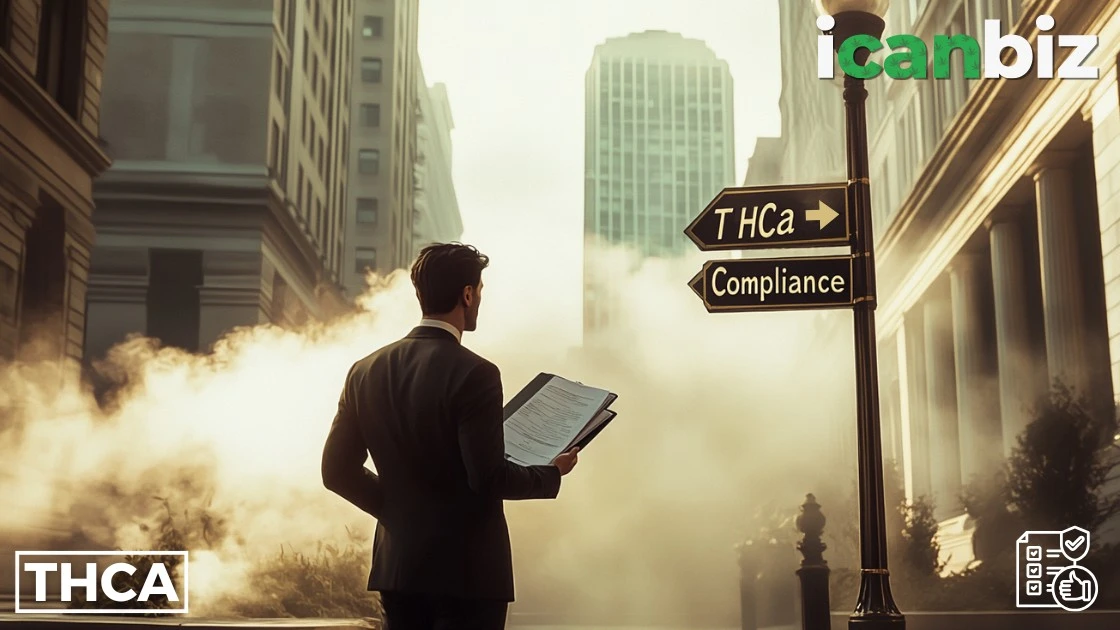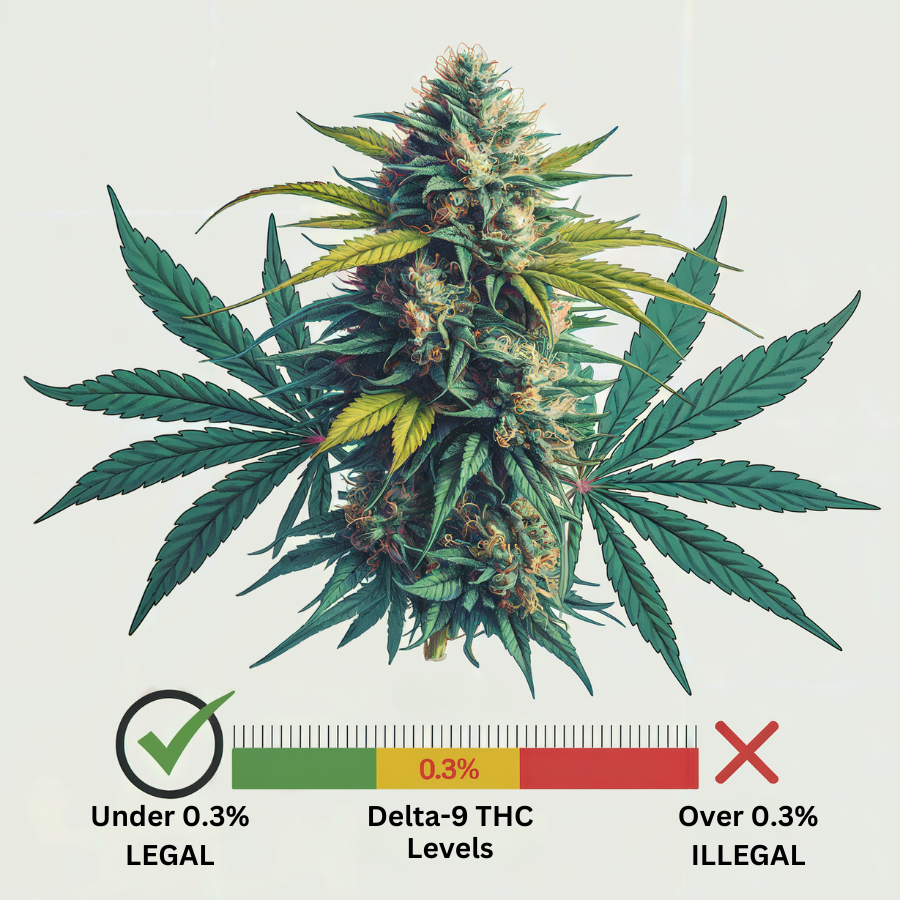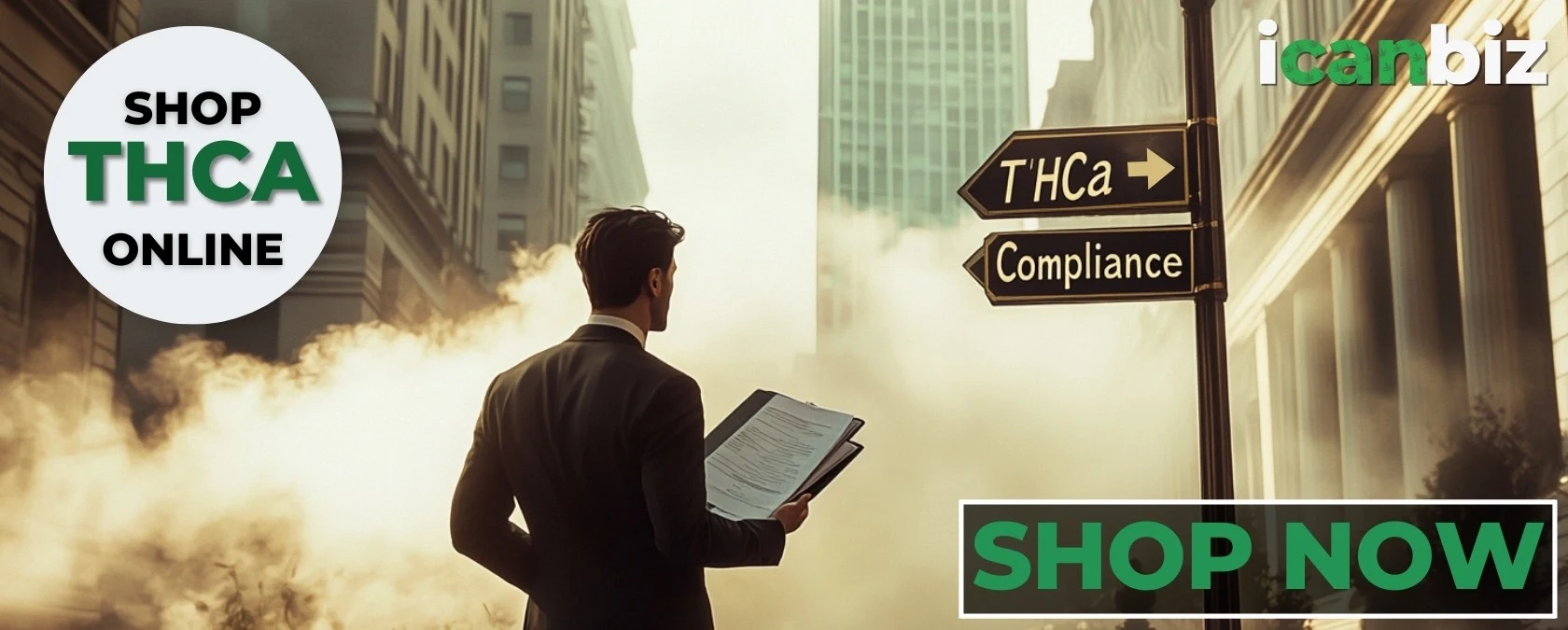Navigating the State Regulations of Wholesale THCa: A Guide to Staying Legal

May the Laws Be Ever in Your Favor
You’d think federal legalization would make wholesale hemp simple. But in this space, the real power lies with the states — and every one of them plays by their own rules. If you’re shipping THCa flower, hemp-derived products, or wholesale cannabis alternatives, knowing the lay of the land isn’t optional — it’s survival. The 2018 Farm Bill federally legalized hemp and hemp-derived cannabinoids (as long as they contain less than 0.3% Delta-9 THC on a dry weight basis). But that bill didn’t create a national standard — it opened the door for every state to run its own version of the Games.
Which means: just because your product is federally legal doesn’t mean you can ship it nationwide.
THCa Flower: Navigating the State-by-State Game in a Federally Legal World
THCa (tetrahydrocannabinolic acid) has quickly become one of the most in-demand cannabinoids in the wholesale market, especially for smokable hemp flower. In its raw, unheated form, THCa is non-psychoactive—meaning it doesn’t produce a “high.” That’s why it falls under the 2018 Farm Bill, which legalized hemp products containing less than 0.3% Delta-9 THC by dry weight.
But, just like anything, the rules can vary depending on where you are.
When THCa is heated—whether you smoke it, vape it, or even bake it—it transforms into Delta-9 THC, the compound responsible for traditional cannabis’ intoxicating effects. This chemical change, called decarboxylation, plays a major role in how many states regulate THCa flower.
Instead of only looking at how much Delta-9 THC is in the raw product, some states use a “Total THC” calculation, which combines Delta-9 THC and the potential THC that could be produced if all the THCa were to convert when heated.
That means if your Certificate of Analysis (COA) shows:
- 0.2% Delta-9 THC (within federal guidelines)
- 18% THCa (which turns into Delta-9 when smoked)
Your product may meet federal standards, but in states that use Total THC testing, it could be treated as more regulated cannabis—not hemp.
The Legal Loophole… and the Landmines: Navigating the Risky Terrain
This gap between federal legality and state enforcement is one of the biggest points of confusion—and risk—in the THCa wholesale market. Many wholesalers assume that a low Delta-9 result on a lab report is enough to greenlight shipping, but, as in any high-stakes competition, the rules are more complex than they appear.
Some states explicitly outlaw THCa-rich flower regardless of federal legality, arguing that the intended use (i.e., smoking) transforms it into a traditional cannabis product. Others allow it, but only under strict packaging, labeling, and licensing requirements. And in certain regions, enforcement depends on the mood of the local peacekeepers and lawmakers office that week.
Why It Matters for Wholesale Orders
For THCa wholesalers and cannabis retailers, the consequences of misclassifying THCa flower can be severe:
- Shipments can be seized
- Retailers can lose their licenses
- Brands can be blacklisted or fined
- Consumers could be unintentionally purchasing non-compliant products
It’s not enough to just meet federal hemp guidelines—you need to understand how THCa is classified and regulated in every area you’re doing business with. One misstep could lead to serious consequences.
The Arena of Regulations: States Where THCa Flower Is Legal, Regulated, or Banned

THCa flower occupies a strange and shifting place in the legal hemp landscape. While it’s federally legal under the 2018 Farm Bill—as long as Delta-9 THC stays below 0.3%—the states hold the power to decide how THCa is classified and enforced. It’s like navigating an arena where every district plays by different rules.
Some states are more permissive, allowing THCa-rich flower under standard hemp regulations. Others impose stricter controls, while a few ban it outright or leave the rules so vague that enforcement becomes a gamble—much like the unpredictable twists that make the Games so perilous.
More Permissive States for THCa Flower
These states generally allow the sale and possession of THCa flower as long as it complies with federal Delta-9 THC limits. However, laws can change fast, so staying ahead of the curve is crucial—after all, the rules could shift at any moment.
- Texas: THCa flower is permitted as long as Delta-9 THC remains below 0.3%. While some law enforcement agencies have targeted smoke shops, statewide policy still follows federal hemp guidelines.
- Florida: THCa is tolerated in the current market, but new legislation is pending. Proposed bills may tighten restrictions on intoxicating hemp products in the near future.
- Tennessee: One of the more hemp-friendly states. As of now, there’s no Total THC requirement, making THCa flower accessible—but lawmakers have hinted at possible changes.
- North Carolina: No total THC testing requirement yet. This creates room for THCa flower to be sold legally, though regulatory developments are worth monitoring.
- New Jersey: Permits hemp-derived products, including THCa, but regulates them under its state cannabis program. Licensing and compliance may be required, even for hemp businesses.
Gray Area States: Legal But Complicated
In these states, THCa flower might be available, but legal clarity is lacking—or rules are enforced inconsistently.
- Georgia: State law mirrors federal guidelines, but enforcement varies by county. Some local authorities have cracked down on THCa despite no explicit statewide ban.
- Colorado: Hemp is legal, but the state uses a Total THC formula. This means if the combined Delta-9 and converted THCa exceed 0.3%, it’s classified as traditional, restricted cannabis—even if the flower is technically compliant by federal standards.
- New York: Allows hemp, but THCa flower faces strict oversight. Operators must comply with packaging, labeling, and licensing rules similar to those for adult-use cannabis. Some retailers have been penalized for carrying THCa flower without the proper authorization.
Highly Restrictive States: THCa Flower Not Welcome
These states either ban THCa directly or have policies so strict that wholesale distribution is nearly impossible.
- California: Despite its reputation for cannabis innovation, the state treats THCa flower as high-THC cannabis. Retailers must have proper cannabis licenses, and selling it as hemp is illegal.
- Oregon: Like Colorado, Oregon uses a Total THC formula. Any product that exceeds 0.3% Total THC (including THCa) is classified as traditional, restricted cannabis.
- Idaho: One of the strictest hemp states. Any detectable amount of THC—including THCa or Delta-8—renders a product illegal. Shipping THCa flower into or through Idaho can lead to legal trouble.
- Iowa: Bans intoxicating cannabinoids like Delta-8, and THCa is likely included. Lawmakers have signaled opposition to smokable hemp products that mimic traditional cannabis.
What Actually Makes a Product Legal to Ship?
Shipping THCa flower or hemp products across state lines isn’t just about having the right product—it’s about having the right paperwork, packaging, and compliance in place. Here’s what you’ll need to check before you send out that next bulk order:
1. Your COA Shows Less Than 0.3% Delta-9 THC
This is the big one. The 2018 Farm Bill made it legal to sell hemp products as long as the Delta-9 THC is below 0.3% by dry weight. That number needs to be backed up by a Certificate of Analysis (COA) from a reputable, third-party lab. If you can’t prove it, you can’t ship it.
2. You’ve Accounted for Total THC
Even if your Delta-9 is under the legal limit, your THCa content could be an issue. Many states now go by Total THC, which means they factor in the amount of THC that could be produced when THCa is heated. So if your flower is rich in THCa, it might be totally fine in one state and considered traditional cannabis in another. Always know your destination’s rules.
3. Your Packaging and Labeling Are On Point
Regulators want to see that your products are clearly labeled and traceable. That usually means:
- Cannabinoid content listed on the label
- Batch or lot numbers
- A QR code that links directly to the COA
- Disclaimers that the product is hemp-derived and not intended for medical use or to get you high
Bottom line? If your label looks sketchy, you’re more likely to end up with your shipment flagged—or worse, confiscated.
Top Compliance Tips for THCa and Hemp Wholesalers
Let’s be real—working in the THCa space means operating in a legal gray area. You can’t just hope for the best and expect things to go smoothly. If you want to build a long-term wholesale business, compliance isn’t optional—it’s a daily habit. Here’s how to do it right:
Know the Laws Everywhere You Ship
Just because your product is legal in your state doesn’t mean it’s good to go in every other one. Before you send anything out the door, check the latest rules from the Department of Agriculture or public health department in your destination state. Some states update frequently, and even one misstep could lead to seized products.
Work With Cannabis-Savvy Attorneys
Just like having the right mentor can make all the difference, choosing the right attorney is crucial in navigating the cannabis industry. You’ll want someone who understands the ins and outs of hemp regulations, wholesale distribution laws, and the complexities of interstate commerce in cannabis-adjacent products.
A skilled lawyer can help you avoid costly mistakes before they happen—guiding you through the legal landscape like a seasoned pro and ensuring you’re on the right path to success.
Use Reputable, ISO-Certified Labs
Not all labs are created equal. If your lab isn’t ISO-certified or doesn’t do full-panel testing, your COAs might not hold up under scrutiny. And if your Total THC isn’t being reported clearly, you could be unintentionally breaking state laws—even if your product is federally compliant.
Keep Your Paperwork Tight
Think of your documentation like a safety net. You should be able to pull up:
- COAs for every batch
- Shipping logs and invoices
- Lab certifications
- Batch records
- Chain-of-custody documentation
If a regulator ever knocks, you’ll be glad you kept it all organized.
Avoid These Common Wholesale Mistakes
A lot of folks in this space get tripped up by the same few issues. Here’s what to watch out for:
Assuming Federal Legality Means You’re Safe
Reality check: Just because something is legal federally doesn’t mean it flies in every state. Some states ban THCa altogether or use Total THC calculations that can turn your compliant flower into more traditional, restricted cannabis in their eyes.
Using Outdated or Incomplete COAs
If your COA is more than a few months old—or doesn’t show both Delta-9 and THCa levels—you’re playing with fire. Make sure your COAs are recent, batch-specific, and fully detailed.
Skipping Packaging Requirements
Even if your flower is clean and compliant, bad labeling can get you flagged. You need clear cannabinoid content, batch info, a scannable COA link, and disclaimers stating the product is hemp-derived and not intended for intoxication.
Shipping to Retailers Who Aren’t Compliant
You might be buttoned-up—but if your buyer isn’t, your product could still be seized. Make sure your retail partners understand local laws, have proper licenses, and know what compliance actually means.
Staying Ahead in a Rapidly Changing Arena
Let’s face it: hemp and cannabis laws move fast. What’s legal today might be banned tomorrow. The wholesalers who succeed long-term are the ones who treat compliance as part of their brand, not just a checklist.
Here’s how to stay ahead:
- Keep tabs on new regulations in every state you serve
- Update your internal compliance procedures regularly
- Train your team on proper testing, labeling, and documentation
- Educate your buyers on what’s legal (and what’s not)
- Watch legislative sessions in key markets—especially states that are considering “Total THC” rules
The Final Hit: Play It Right or Risk Losing It All
The THCa and hemp industry is thriving—but so is the regulatory oversight. If you want to grow a true empire, you can’t cut corners on compliance.
Whether you’re selling smokable flower, concentrates, or tinctures, staying on top of local and federal laws isn’t just about avoiding fines. It’s about building trust with retailers, protecting your inventory, and keeping your business scalable as the market evolves.
Play the game wisely, and you won’t have to rebuild your empire from the ground up.

Legal Disclaimer:
By reading this information presented, you agree to release the author of any liability that comes from using this data. This post contains no legal advice. Claims about cannabinoids have not yet been approved by the FDA.
Sources
- https://www.nasdaq.com/articles/cannabis-market-forecast-top-trends-cannabis-2025
- https://www.expressnews.com/business/article/thc-cannabis-texas-ban-dan-patrick-sid-miller-19962200.php
- https://nypost.com/2024/09/01/us-news/bargain-buzz-ny-pot-farm-moves-100000-economical-dime-bags-under-legalization
frequently asked questions
Is THCa flower legal everywhere in the US?
No. Legality varies by state—some ban it outright, others regulate under “Total THC” rules.
What is "Total THC"?
It’s the combined amount of Delta-9 THC and THCa after decarboxylation—some states use this to classify legality.
Can I ship THCa flower if my COA shows 0.3% Delta-9 THC?
Not always. Some states consider THCa content and still classify it as restricted cannabis.
Which states are safest for shipping THCa flower?
States like Texas, Florida, and North Carolina are generally more permissive—laws can change quickly, though.
What documents do I need to ship legally?
You’ll need recent COAs, batch records, packaging compliance, and shipping logs—all tied to the destination state’s law.
